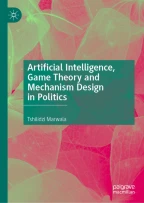Game Theory in Politics

Game theory has become an indispensable tool in international politics, offering valuable insights into the complex and strategic decision-making processes that govern the interactions between nations, international organizations, and non-state actors. As a mathematical framework for understanding strategic behavior and predicting outcomes, game theory allows scholars and policymakers to model and analyze the myriad of factors that influence the actions and choices of actors on the international stage. This chapter explores the role of game theory in international politics, highlighting its key concepts, applications, and contributions to our understanding of global dynamics. Additionally, we discuss the potential limitations and challenges of applying game theory in the intricate and ever-changing landscape of international politics.
This is a preview of subscription content, log in via an institution to check access.
Access this chapter
Subscribe and save
Springer+ Basic
€32.70 /Month
- Get 10 units per month
- Download Article/Chapter or eBook
- 1 Unit = 1 Article or 1 Chapter
- Cancel anytime
Buy Now
Price includes VAT (France)
eBook EUR 93.08 Price includes VAT (France)
Softcover Book EUR 116.04 Price includes VAT (France)
Hardcover Book EUR 116.04 Price includes VAT (France)
Tax calculation will be finalised at checkout
Purchases are for personal use only
Notes
References
- Adler, I. (2013). The equivalence of linear programs and zero-sum games. International Journal of Game Theory,42(1), 165. ArticleGoogle Scholar
- Amadae, S. M. (2016). Prisoners of reason: Game theory and neoliberal political economy. Cambridge University Press. Google Scholar
- Aumann, R. J. (1987). Game theory. In J. Eatwell, M. Milgate, & P. Newman (Eds.), The new Palgrave: A dictionary of economics. Macmillan. Google Scholar
- Beckenkamp, M., Hennig‐Schmidt, H., & Maier-Rigaud, F. P. (2007). Cooperation in symmetric and asymmetric prisoner’s dilemma games. MPI Collective Goods Preprint (2006/25). Google Scholar
- Bernheim, B. D., Peleg, B., & Whinston, M. D. (1987). Coalition-proof Nash equilibria I. concepts. Journal of Economic Theory, 42(1), 1–12. Google Scholar
- Bierman, H. S., & Fernandez, L. F. (1998). Game theory with economic applications. Addison-Wesley. Google Scholar
- Camerer, C. F. (2011). Behavioral game theory: Experiments in strategic interaction. Princeton University Press. Google Scholar
- Carmona, G., & Podczeck, K. (2009). On the existence of pure-strategy equilibria in large games. Journal of Economic Theory,144(3), 1300–1319. ArticleGoogle Scholar
- Chess, D. M. (1988). Simulating the evolution of behavior: The iterated prisoners’ dilemma problem. Complex Systems,2(6), 663–670. Google Scholar
- Collins, R. W. (2022). The Prisoner’s Dilemma paradox: Rationality, morality, and reciprocity. Think,21(61), 45–55. ArticleGoogle Scholar
- Dutta, P. K. (1999). Strategies and games: Theory and practice. MIT Press. Google Scholar
- Fisher, R. A. (1930). The genetical theory of natural selection. Clarendon Press. BookGoogle Scholar
- Harsanyi, J. C. (1973). Oddness of the number of equilibrium points: A new proof. International Journal of Game Theory,2(1), 235–250. ArticleGoogle Scholar
- Hew, S. L., & White, L. B. (2008). Cooperative resource allocation games in shared networks: Symmetric and asymmetric fair bargaining models. IEEE Transactions on Wireless Communications,7(11), 4166–4175. ArticleGoogle Scholar
- Kreps, D. M. (1987). Nash equilibrium. In The new Palgrave dictionary of economics. Palgrave Macmillan. Google Scholar
- Marwala, T. (2013). Multi-agent approaches to economic modeling: Game theory, ensembles, evolution and the stock market. In Economic modeling using artificial intelligence methods (pp. 195–213). Springer. Google Scholar
- Marwala, T., & Hurwitz, E. (2017). Game theory. In Artificial intelligence and economic theory: Skynet in the market (pp. 75–88). Springer. Google Scholar
- Munoz-Garcia, F., & Toro-Gonzalez, D. (2019). Pure strategy Nash equilibrium and simultaneous-move games with complete information. In Strategy and game theory: Practice exercises with answers (pp. 39–86). Springer. Google Scholar
- Nash, J. F., Jr. (1950). Equilibrium points in n-person games. Proceedings of the National Academy of Sciences,36(1), 48–49. ArticleGoogle Scholar
- Olson, E. S. (2010). Zero-sum game: The rise of the world’s largest derivatives exchange. Wiley. Google Scholar
- Poundstone, W. (1993). Prisoner’s dilemma: John von Neumann, game theory, and the puzzle of the bomb. Anchor. Google Scholar
- Rapoport, A., & Chammah, A. M. (1966). The game of chicken. American Behavioral Scientist,10(3), 10–28. ArticleGoogle Scholar
- Rapoport, A., Chammah, A. M., & Orwant, C. J. (1965). Prisoner’s dilemma: A study in conflict and cooperation (Vol. 165). University of Michigan Press. Google Scholar
- Schneider, M., & Shields, T. (2022). Motives for cooperation in the one-shot Prisoner’s Dilemma. Journal of Behavioral Finance,23(4), 438–456. ArticleGoogle Scholar
- Sun, C. H. (2020). Simultaneous and sequential choice in a symmetric two-player game with canyon-shaped payoffs. The Japanese Economic Review,71(2), 191–219. ArticleGoogle Scholar
- Washburn, A. (2014). Single person background. Two-Person Zero-Sum Games, 1–4. Google Scholar
- Wilson, R. (1971). Computing equilibria of n-person games. SIAM Journal on Applied Mathematics,21(1), 80–87. ArticleGoogle Scholar
Author information
Authors and Affiliations
- United Nations University, Tokyo, Japan Tshilidzi Marwala
- Tshilidzi Marwala
You can also search for this author in PubMed Google Scholar
Corresponding author
Rights and permissions
Copyright information
© 2023 The Author(s), under exclusive license to Springer Nature Singapore Pte Ltd.
About this chapter
Cite this chapter
Marwala, T. (2023). Game Theory in Politics. In: Artificial Intelligence, Game Theory and Mechanism Design in Politics. Palgrave Macmillan, Singapore. https://doi.org/10.1007/978-981-99-5103-1_2
Download citation
- DOI : https://doi.org/10.1007/978-981-99-5103-1_2
- Published : 05 August 2023
- Publisher Name : Palgrave Macmillan, Singapore
- Print ISBN : 978-981-99-5102-4
- Online ISBN : 978-981-99-5103-1
- eBook Packages : Political Science and International StudiesPolitical Science and International Studies (R0)
Share this chapter
Anyone you share the following link with will be able to read this content:
Get shareable link
Sorry, a shareable link is not currently available for this article.
Copy to clipboard
Provided by the Springer Nature SharedIt content-sharing initiative

